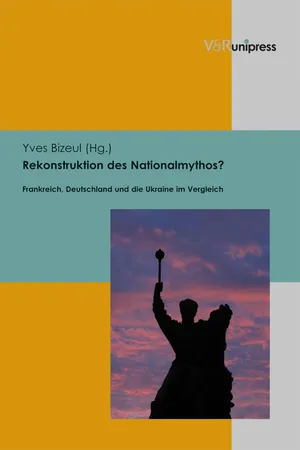
Rekonstruktion des Nationalmythos?
Frankreich, Deutschland und die Ukraine im Vergleich
- 266 Seiten
- German
- PDF
- Über iOS und Android verfügbar
Über dieses Buch
Most unitary and essentialist national myths have been disenchanted after the two world wars and the period of national socialism in Germany. Especially for todays »postnational constellation« (Habermas) of globalization the concept of the nation as a source of social coherence seems outworn. At the same time, a variety of public and civil society actors try to reinforce a new and universal »Monomythos« (Marquard).These attempts of a mythical reinstallation in postmodern society and media raise the following questions: What is the distinct difference between the contemporary myths and the ones of the early modern period? Who are the initiators of these national myths? On which ideologies and convictions are they based? What are the instruments and resources used in the struggle for constructing national history? And finally, who are the opponents to these efforts and how do they oppose?These questions have been discussed at the international conference »Reconstructions of national myths? France, Germany and the Ukraine in comparison«, hold by the chair of political theory and the history of political thought of the University of Rostock at 8 October, 2011. This transcript publishes the conference contributions plus two additional articles analyzing the contemporary politics of memorization from a perspective of European cultural anthropology. A concluding essay by the editor completes the conference transcript.
Häufig gestellte Fragen
- Elementar ist ideal für Lernende und Interessierte, die gerne eine Vielzahl von Themen erkunden. Greife auf die Elementar-Bibliothek mit über 800.000 professionellen Titeln und Bestsellern aus den Bereichen Wirtschaft, Persönlichkeitsentwicklung und Geisteswissenschaften zu. Mit unbegrenzter Lesezeit und Standard-Vorlesefunktion.
- Erweitert: Perfekt für Fortgeschrittene Studenten und Akademiker, die uneingeschränkten Zugriff benötigen. Schalte über 1,4 Mio. Bücher in Hunderten von Fachgebieten frei. Der Erweitert-Plan enthält außerdem fortgeschrittene Funktionen wie Premium Read Aloud und Research Assistant.
Bitte beachte, dass wir keine Geräte unterstützen können, die mit iOS 13 oder Android 7 oder früheren Versionen laufen. Lerne mehr über die Nutzung der App.
Information
Inhaltsverzeichnis
- Title Page
- Copyright
- Table of Contents
- Body
- Danksagung
- Yves Bizeul (Rostock): Reaktivierungsversuche des Nationalmythos – die Suche nach der verlorenen Orientierung
- Frédéric Monneyron (Perpignan): Der Mythos, das Imaginäre und die Nation
- Joanna Nowicki (Cergy-Pontoise): Die Bedeutung von Mythen und nationalen Symbolen in den Kulturen Mitteleuropas
- Nicolas Offenstadt (Paris): Die „Geschichtspolitik“ während der fünfjährigen Amtszeit Nicolas Sarkozys. Streitfragen und Debatten (2007–2012)
- Hans-Ulrich Thamer (Münster): Das Deutsche Historische Museum – ein nationaler Erinnerungsort?
- Beate Binder (Berlin): Vom Preußischen Stadtschloss zum Humboldt-Forum: Der Berliner Schlossplatz als neuer nationaler Identifikationsort
- Julia Oppermann (Rostock): Mediale Geschichtsbilder: „Die Deutschen“ im ZDF
- Irene Götz (München): Die Wiederentdeckung des Nationalen nach 1989. Einige Streiflichter auf die Pluralisierung und Informalisierung eines polyvalenten Konzeptes
- Manuel Becker/Volker Kronenberg (Bonn): Patriotismus und nationale Identität in der „Berliner Republik“. Eine Verortung des „Sommermärchens“ Fußball-WM 2006 in der politischen Kultur der Bundesrepublik
- Matthias Waechter (Nizza): Nach dem Sonderweg? Konstruktion und Rekonstruktion der deutschen Geschichte nach 1990
- Ludmila Lutz Auras (Rostock): Zwischen Stolz und Missbilligung. Der Zweite Weltkrieg in der Erinnerungspolitik der Russländischen Föderation und der Ukraine
- Per Anders Rudling (Lund): Memories of “Holodomor” and National Socialism in Ukrainian political culture
- Yves Bizeul (Rostock): Fazit: Vom Nationalmythos zum Mythos Europa